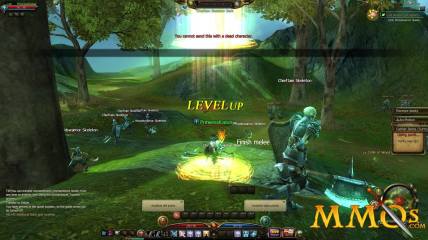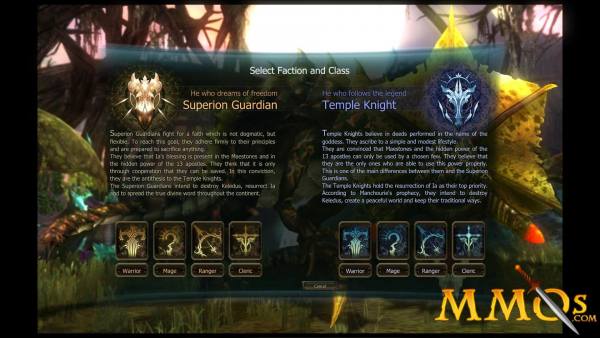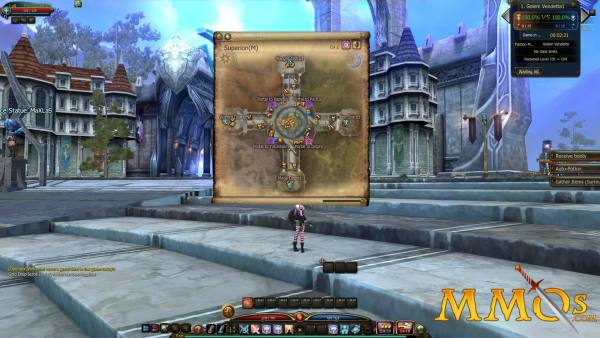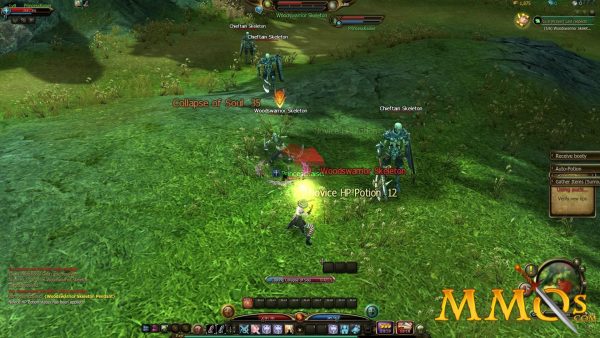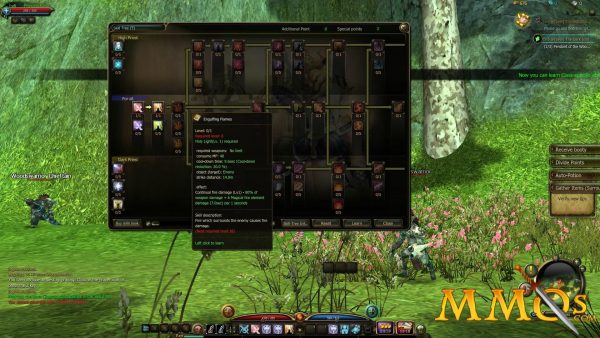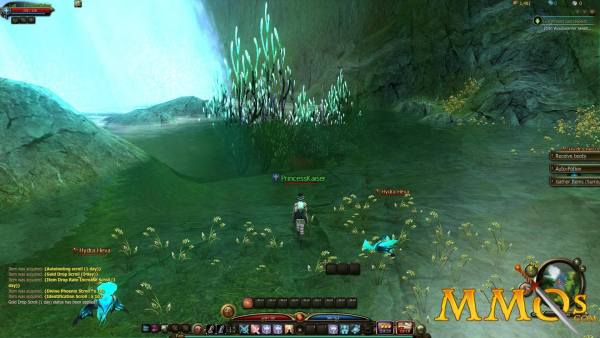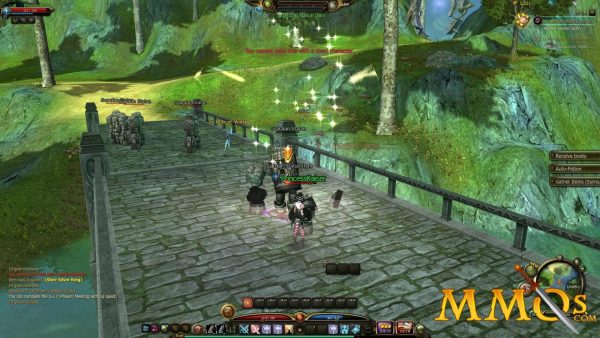Maestia
Maestia is a 3D fantasy-themed MMORPG with two warrings factions – the Superion Guardians and the Templar Knights. Maestia features a unique skill system where abilities are bound to powerful gems called Maestones.
| Publisher: Aeria Games Playerbase: Low Type: MMORPG PvP: Duels / Faction Wars / Guild vs Guild Release Date: July 19, 2012 (NA/EU) Shut Down Date: March 31, 2016 Pros: +Unique skill system (Maestones). +Tons of skill variety. +Great Divinity system. +Good item system. Cons: -Few classes. -Repetitive gameplay. |
Maestia Overview
Maestia: Rise of Keledus is a semi-realistic fantasy MMORPG. Maestia is a world where two factions are trying to defeat an enemy known as “The Dark Lord.” Players must choose between the Goddess-orientated Temple Knights, or the Superion Guardians. The game features a unique dual progression system where players earn both experience and divinity points for killing enemies. Maestia's more interesting features are its Maestia system, where players equip gems that give various active and passive abilities, and the its varied skill trees. There are only four classes in Maestia. Maestia was shut down on March 31, 2016.
Maestia Key Features:
- 4 Classes – choose from the unique classes of Clerics, Mages, Rangers, or Warriors.
- Conquer Dungeons – play through dungeons in either Normal, Expert, or Time Attack modes.
- Divinity/Maestone System – earn Divinity Points (DPs) by praying, killing enemies, and participating in PvP. Use DPs to buy Maestones to enhance your character.
- Hire Mercenaries – no need to adventure alone. Hire NPC mercenaries to fight alongside your character or hire actual players to act as your mercenaries (when they're offline!).
Maestia Screenshots
Maestia Featured Video
Maestia Classes
Warrior – this is the basic warrior class. They have high strength and defense, and can be equipped with heavy armor for protection.
Ranger – Rangers specialize in speed and agility. They use bows, short swords, or daggers to deal fast damage to enemies.
Cleric – this class utilizes certain magic abilities to heal themselves and their allies. While they don’t have the best defense, the ability to heal more than makes up for it.
Mage – Mages use long-ranged magical abilities to land devastating blows to their enemy. With great range and a variety of magic spells, Mages are powerful combatants.
Maestia Review
By Jayne Moss
Maestia: Rise of Keledus is a 3D fantasy MMORPG developed by Rocks Network in South Korea. It was published in the United States by Gravity Interactive on November 30, 2011, and was then later acquired by Aeria Games. The world of Maestia has a complicated backstory with beautiful scenery and amazing music.
Getting Started
Maestia has the same basic character creation options as any other MMO. There are few options to pick from when it comes to hair styles, faces, body shapes, and height. I was worried that that would be all Maestia had to offer, but I was pleasantly surprised to find that I could choose to have any hair or skin color from red to green. Literally every color is available. I’m honestly surprised more games don’t do this. I can’t see it being that difficult to program in, and it gives character creation some variety.
After creating a character, players start the tutorial in the city of Superion. Maestia’s tutorial is pretty basic, having players do some easy quests to get use to the controls of the game. It was helpful, but offered little for anyone already familiar with MMOs.
The storyline is overly complicated and often poorly translated, but it doesn’t have a negative effect on the game. Some of the dialogue between my character and NPCs were sometimes so poorly translated and unnatural sounding, that it was almost funny to see.
Leveling was pretty easy at first, but experience gain slowed down a lot by Level 15. It was more of a challenge to gain experience in Maestia than in other games I’ve played. At times, it felt easier to gain levels by grinding than by questing. Reaching Maestia’s max level cap of 100 is definitely a feat of endurance.
The World of Maestia
After playing around with Maestia, I had some mixed feelings. The graphics had some variety, with expansive maps that made me feel like there were a lot of places to go. The textures added a striking amount of detail to everything, the buildings were to scale, and the environment is full of plant life that makes the scenery really stand out. While the game's generic fantasy theme felt similar to other games, Maestia did it better than most. Overall, the graphics were amazing. I really felt like the developers took their time working out the details. The music had a lot of variety and always fit the mood. Out of everything, the music in Maestia is what kept me interested the most.
Maestia gives players the options between using the WSAD keys or point-and-click to move their characters around. At times, the interface felt hard to navigate, and the look was a little dated. Players are also able to click a button and go directly to items, NPCs, or monsters they need for a quest. There’s even an option to equip HP/MP potions to be used automatically after health drops below a certain point. While these are nice features, I felt it was a little too convenient.
The skills in Maestia, like in most MMOs, are defined by skill trees. Upon leveling up, players get a single skill point that can be used to learn or improve skills in their class-specific skill tree. Players can also learn certain skills exclusively from skillbooks, which can be purchased from merchants.
Players also have the ability to fish, which is a nice and enjoyable feature. All that's needed to fish is a fishing rod. Players can catch fish that will restore their health, and they can also find other items. There are also activities like crafting and harvesting.
Large Scale PvP
PvP plays a big role in Maestia. Players can join either the Superion Guardians or Temple Knights factions. At Level 100, players can fight for their faction in faction wars, a large scale PvP system where players work with their fellow faction. Haven't reached Level 100 yet? No problem. Players who aren’t Level 100 are temporarily given enchanted items to strengthen them. The outnumbered faction gets enchanted jewelry to make the war fair. Unfortunately, players wearing the jewelry are shown on the map, causing them to be bigger targets for the other team. Players are awarded kill points for every player they defeat. These points can be used to purchase special PvP armor. As someone who really enjoys PvP, the faction wars really added a lot to the game. While there were other types of PvP, like guild battles and small PvP battlegrounds, the wars were a lot more intense because of the massive amount of players.
Prayer, Divinity Points, and Maestones
Prayer plays an important role in Maestia. By pressing Z, players can summon an NPC through “praying.” This NPC has quests which can be accepted and handed-in by players anywhere without needing to find an NPC.
Praying at altars allows players to rack up “Divinity Points,” a custom currency that players can use to purchase Maestones. Players can get DPs in a few ways, such as killing monsters in dungeons, playing on the night map, and by renting out their character as a mercenary. This additional method of character progression means that players at the level cap can continue growing their character by acquiring more and more DPs.
Maestones are special stones found in Maestia that can be used to increase a character’s performance. Maestones can help players make up for any weaknesses their character may have. There are two different types of Maestones: passive and active. Passive Maestones give characters a 3% chance of triggering certain conditions. For example, a passive Maestone can trigger a 3% chance of increased damage against enemies. The Maestones can be upgraded to make that chance higher. Active Maestones always trigger the condition, but can only be used 10 times. After that, you’ll have to go recharge them for 10 DPs.
Each character has three slots for active Maestones and four for passive Maestones. When you have three Maestones of the same type, you can upgrade them to +1, which will make them more effective. For example, a 3% passive Maestones become 4%. Any general goods NPC can upgrade a Maestone. The entire Maestone system reminds me of the skill system in Path of Exile, where skills are bound to these gems rather than directly to a character.
Become a Mercenary
Players also have the option of becoming a work-for-hire mercenary. While offline, players can basically rent out their character to other players. While offline, the character gets 20% experience from anything the other player made them do. Through this, players can hire other characters to work by their side. This feature works to benefit both the person hiring and the person working. Before hiring a mercenary, players can take a look at their equipment, skills, and later rate their assistance. This means players are actually renting real people’s characters. Besides other players, people can also hire NPCs to work beside them. For people who have a hard time finding people to play with, these work-for-hire mercenaries can allow them to have the feeling of a party without actually needing someone else around.
Final Verdict – Good
While Maestia: Rise of Keledus isn’t the most polished game out there, it does have a lot going for it. With options like hiring out as a mercenary, its unique Maestone skill system, and accepting quests from any location, Maestia seems to have a lot of features that can hold a player’s interest. However, aside from a few features, there wasn’t a lot that really stood out about this game. Maestia: Rise of Keledus gets 3/5 stars.
Maestia Videos
Maestia Links
Maestia Official Site
Maestia Official Game Guide
Maestia Wikia [Database / Guides]
Maestia System Requirements
Minimum Requirements:
Operating System: Windows XP / Vista / 7 / 8
CPU: Single Core 3 GHz
Video Card: GeForce 6800 GT or better
RAM: 1 GB
Hard Disk Space: 14 GB
Recommended Requirements:
Operating System: Windows XP / Vista / 7 / 8
CPU: Dual Core 2 GHz or better
Video Card: GeForce 8600 GT or better
RAM: 4 GB
Hard Disk Space: 14 GB
Maestia Music & Soundtrack
Maestia Additional Information
Developer: Roc Works
Closed Beta Date: June 14, 2012
Open Beta: July 19, 2012
Foreign Releases:
Japan: October 1, 2009
Shut Down Date: March 31, 2016
Development History / Background:
Maestia was developed by Roc Works, a game studio originally founded in Japan. Maestia originally launched as Project Homeage Genesis in Japan and entered into Open Beta in Japan on October 1, 2009. Since the game's relative success in Japan, the game launched in Korea and Taiwan under the same name. The game's English release has been less successful. Bigpoint originally acquired the European license for the game while Gravity Interactive grabbed the North American license through its Warpportal service. Gravity shut the game down and Aeria Games picked up the service on June 17, 2013.
